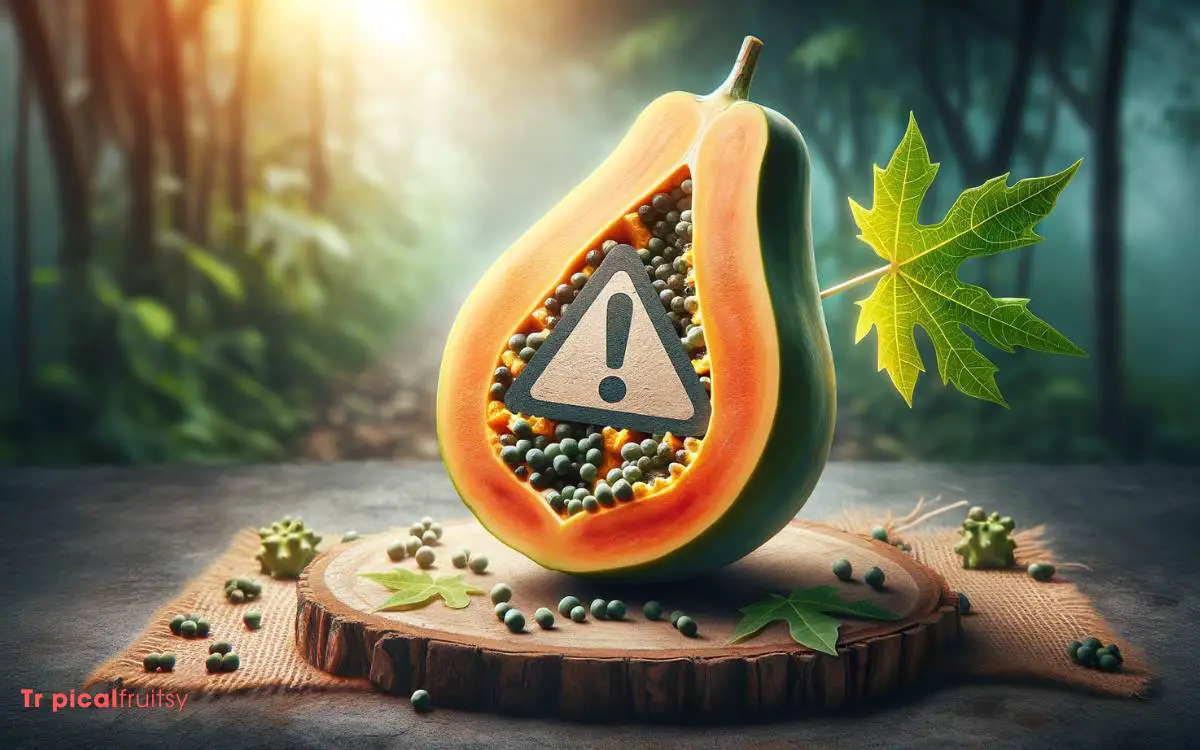Tropical Fruits That Can Cause Miscarriage: Explore!
Pregnant women are often advised to avoid certain tropical fruits due to the risk they may pose, such as triggering miscarriage.
Key fruits of concern include unripe papaya, pineapple, graviola (soursop), bitter melon, and improperly ripened ackee.
These fruits contain substances that could potentially lead to uterine contractions or have toxic effects when consumed in large quantities or when not prepared correctly.
The reason behind the caution with these tropical fruits is their chemical composition:
It’s important to note that moderate consumption of these fruits may not be harmful; however, due to the lack of conclusive scientific evidence and the stakes involved, caution is recommended.
Ensure the safety of both mother and child by being cautious with dietary choices, especially regarding the consumption of certain tropical fruits.

Key Takeaway
Tropical Fruits to Avoid During Pregnancy and Potential Risks
| Fruit | Concerning Substance | Potential Effect | Note of Caution |
|---|---|---|---|
| Unripe Papaya | Latex | Uterine contractions | Should be avoided in pregnancy |
| Pineapple | Bromelain | Cervix softening | Risky in large amounts |
| Graviola | Alkaloids, Acetogenins | Toxicity in high doses | Consumption is not recommended |
| Bitter Melon | Alkaloids, Saponins | Toxic effects | Avoid excessive intake |
| Ackee | Hypoglycin A and B | Toxicity if unripe | Must be fully ripened before consumption |
Unripe Papaya Risks

Consuming unripe papaya can pose a miscarriage risk due to its concentration of latex, which may trigger uterine contractions.
Studies have suggested that this latex acts similarly to prostaglandin and oxytocin, which are involved in childbirth.
The presence of papain, an enzyme in unripe papaya, is also thought to contribute to its potential to induce labor prematurely.
Pregnant women are advised to avoid the consumption of unripe papaya, particularly in their first trimester, when the embryo is most vulnerable.
It is crucial for expectant mothers to consult with healthcare providers regarding their dietary choices.
This caution is based on the principle of primum non nocere, ‘first, do no harm,’ which is paramount in prenatal care.
Pineapple’s Miscarriage Myth

The belief that pineapple consumption during pregnancy can lead to miscarriage is a widely circulated myth lacking robust scientific evidence.
Pineapples contain bromelain, an enzyme that is thought to soften the cervix and potentially lead to premature labor.
However, the enzyme is predominantly found in the stem and core of the pineapple—parts that are typically not consumed—and the amount in the edible flesh is not sufficient to have a significant physiological impact.
To understand the myth’s lack of foundation, consider:
- No Direct Correlation: Clinical studies do not support a direct link between moderate pineapple consumption and miscarriage.
- Nutritional Benefits: Pineapples are a rich source of vitamins and minerals beneficial for pregnancy when eaten in moderation.
- Professional Consensus: Medical professionals generally do not restrict the consumption of pineapple, but advise moderation and variety in a prenatal diet.
Expectant mothers should always consult with their healthcare providers regarding dietary concerns and adhere to personalized medical advice.
Graviola Safety Concerns

Following the examination of pineapple-related myths, attention now turns to graviola—a fruit that, despite its health benefits, has raised safety concerns due to potential risks associated with its consumption during pregnancy.
Graviola, also known as soursop, has been linked to a variety of medicinal properties but also poses certain risks.
| Potential Benefit | Safety Concern |
|---|---|
| Antioxidant-rich | Neurotoxicity |
| Anticancer claims | Uterine contractions |
| Pain relief | Insufficient research |
The evidence suggests that while graviola may have health-promoting qualities, there is a lack of comprehensive research on its effects during pregnancy, particularly concerning any miscarriage-related risks.
Moreover, there are reports of potential neurotoxic effects, which necessitate caution among pregnant women.
As we continue to prioritize maternal health, a similarly careful approach must be taken when considering the consumption of bitter melon, which will be discussed in the following section.
Bitter Melon Warning

While graviola has been highlighted for its medicinal potential, bitter melon merits caution as its ingestion during pregnancy may be associated with increased risks of miscarriage.
This tropical fruit, although packed with nutrients, contains certain compounds that may lead to adverse reproductive outcomes.
Here are the concerns:
- Teratogenic Compounds: Bitter melon has been found to harbor constituents that could cause developmental abnormalities or miscarriage.
- Uterine Activity: Some studies suggest that bitter melon can induce uterine contractions, which might lead to preterm labor or miscarriage.
- Traditional Medicine Precedents: In various cultures, bitter melon has been used to induce menstrual flow, which underscores its potential risk in triggering miscarriage.
Expectant mothers should approach bitter melon consumption with caution, understanding the delicate balance required during pregnancy.
This caution extends to other exotic fruits, such as ackee, which will be discussed in the following section on ‘Ackee Consumption Cautions’.
Can Eating Tropical Fruits Like Apricots Lead to Miscarriage?
Eating apricots, a tropical fruit, is generally safe during pregnancy. However, excessive consumption can increase the risk of miscarriage due to the high levels of vitamin A. It’s best to enjoy a variety of fruits in moderation to ensure a healthy pregnancy.
Ackee Consumption Cautions

How does ackee consumption impact pregnancy, given its known health benefits and potential risks?
The ackee fruit, native to West Africa, is rich in essential fatty acids, vitamin A, zinc, and protein, which are beneficial for overall health, including during pregnancy.
However, it also contains hypoglycin A, a toxin that can cause severe vomiting if the fruit is eaten unripe or improperly prepared, known as Jamaican vomiting sickness.
| Considerations for Ackee Consumption | Recommendation |
|---|---|
| Ripeness of Ackee | Only consume fully ripe ackee to avoid hypoglycin A toxicity. |
| Preparation | Ensure proper preparation by experienced individuals. |
| Consultation with Healthcare Provider | Discuss with a healthcare professional before including ackee in a pregnancy diet. |
Pregnant women should exercise caution and seek advice from healthcare professionals before consuming ackee due to its potential risks.
Conclusion
The consumption of certain tropical fruits such as unripe papaya, graviola, bitter melon, and ackee carries potential risks for pregnant women, including miscarriage.
While the association between pineapple and miscarriage appears to be a myth, it is imperative for expecting mothers to consult healthcare professionals before including these fruits in their diet.
Evidence-based caution is advised, as studies show that over 50% of participants are unaware of the risks associated with these fruits during pregnancy.






